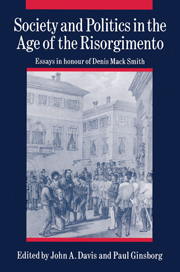Book contents
- Frontmatter
- Contents
- List of figures and maps
- List of contributors
- Preface
- Map 1 Italy in 1815
- Map 2 Italy in 1870
- Map 3 Italy – place names
- 1 1799: the Santafede and the crisis of the ancien régime in southern Italy
- 2 War and society in Napoleonic Italy: the armies of the Kingdom of Italy at home and abroad
- 3 The poor and how to relieve them: the Restoration debate on poverty in Italy and Europe
- 4 Bandits, violence and the organization of power in Sicily in the early nineteenth century
- 5 Marriage and the family in Italy in the early nineteenth century
- 6 After the Revolution: bandits on the plains of the Po 1848–54
- 7 Labouring women in northern and central Italy in the nineteenth century
- 8 Garibaldi in England: the politics of Italian enthusiasm
- 9 The middle classes in Liberal Italy
- 10 Francesco De Sanctis: the politics of a literary critic
- Bibliography of Denis Mack Smith's writings on nineteenth-century Italy
- Index
3 - The poor and how to relieve them: the Restoration debate on poverty in Italy and Europe
Published online by Cambridge University Press: 30 January 2010
- Frontmatter
- Contents
- List of figures and maps
- List of contributors
- Preface
- Map 1 Italy in 1815
- Map 2 Italy in 1870
- Map 3 Italy – place names
- 1 1799: the Santafede and the crisis of the ancien régime in southern Italy
- 2 War and society in Napoleonic Italy: the armies of the Kingdom of Italy at home and abroad
- 3 The poor and how to relieve them: the Restoration debate on poverty in Italy and Europe
- 4 Bandits, violence and the organization of power in Sicily in the early nineteenth century
- 5 Marriage and the family in Italy in the early nineteenth century
- 6 After the Revolution: bandits on the plains of the Po 1848–54
- 7 Labouring women in northern and central Italy in the nineteenth century
- 8 Garibaldi in England: the politics of Italian enthusiasm
- 9 The middle classes in Liberal Italy
- 10 Francesco De Sanctis: the politics of a literary critic
- Bibliography of Denis Mack Smith's writings on nineteenth-century Italy
- Index
Summary
A cry of alarm, which originated a few years ago in the British Isles, has echoed through Europe, spreading universal terror. It warns against the invasion of a scourge which threatens social prosperity, peace and quiet in the world, civilization itself. A new term has been invented to describe the new danger. There is fear on all sides that a swarm of indigents is about to rise up: some believe they have already sighted it; all assume that it will be without bounds. The danger has been accepted as continuous without any evidence, and writers have vied with each other to discover its causes and suggest remedies. There has been an exaggerated preoccupation with population, marriages, manufactures, and large cities. But above all the system of public charity has been indicted as responsible for this calamity that has so struck the public imagination.
Nine years before Karl Marx's spectre of communism, Joseph-Marie de Gérando evoked the fear of pauperism, in order to combat what he saw as the misleading and dangerous conclusions that contemporaries deduced from it. Pauperism, a word that entered into public usage in England from 1815 and France from 1823, was seen as a new phenomenon. It was interpreted for the most part in terms of either the Malthusian theory of early marriage and consequential uncontrolled increase of population, or that of the political economists, in which the division of labour and urbanization functioned as motive forces. For de Gerando, the obsession with what he saw as a passing phase of an ageold and controllable problem needed to be re-dimensioned, precisely because it placed in doubt two fundamental and complementary values: technological progress and Christian charity.
- Type
- Chapter
- Information
- Society and Politics in the Age of the RisorgimentoEssays in Honour of Denis Mack Smith, pp. 49 - 69Publisher: Cambridge University PressPrint publication year: 1991
- 4
- Cited by

